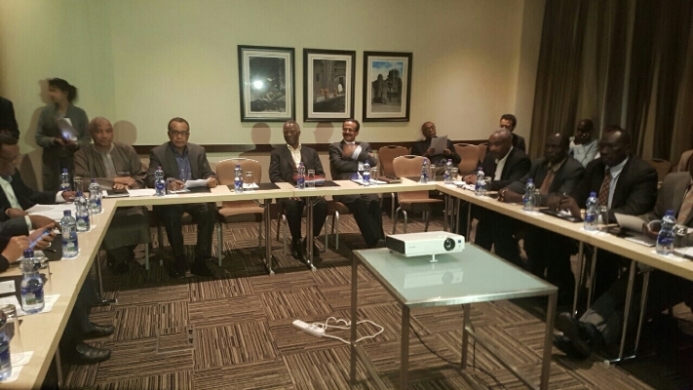AUHIP urges Sudanese parties to reconsider positions on peace talks

August 17, 2016 (ADDIS ABABA) – The African Union High Level Implementation Panel (AUHIP) called on the Sudanese negotiating parties to reassess their positions following the failure of a recent round of peace talks on Darfur and the Two Areas.
After a series of talks in Addis Ababa between 9 to 14 August, the Sudanese government, Sudan People’s Liberation Movement-North (SPLM-N) Sudan Liberation Movement–Minni Minnawi (SLM-MM), Justice and Equality Movement (JEM) failed to sign cessation of hostilities and humanitarian access agreements.
AUHIP mediators, UN special envoy and the Ethiopian government sought in vain to bridge the gaps between the negotiators to reach a humanitarian truce and to move towards discussions of other confidence building measures ahead of an inclusive constitutional conference.
In a statement released on Wednesday, the mediation said “extremely concerned” by the failure of the talks, saying it stalled the momentum generated by the signing of the Roadmap Agreement by the armed groups and the opposition National Umma Party (NUP) on 8 August.
“The Panel strongly urges each Party to reconsider any position that has impeded progress on the implementation of the Roadmap Agreement to which they are committed,” said the AUHIP.
The African Union mediation further said it “will await a demonstration of leadership and vision from the Parties”, stressing that the process of the Roadmap, “holds the strongest hope for achieving the stability and democratic transformation of Sudan”.
The Sudanese government and opposition groups accused each other of hampering the peace process. However, this time the mediation also seemed keen to give it version on the situation.
On Darfur talks, the AUHIP said the obstacles arose when JEM and SLM-MM “re-opened numerous issues that had previously been agreed and others which contradicted the Roadmap Agreement”.
The Panel further said the rebel groups refused “balanced options” the mediation proposed on the location sites of fighters and mechanisms for the monitoring of humanitarian assistance.
“While the Government accepted those proposals, the introduction of new issues by the JEM and SLM-MM, inevitably broke the negotiations”.
On the Two Areas, the Sudanese government and the SPLM-N only disagreed a limited part of the humanitarian assistance the rebels demanded to transported through Asosa Ethiopia.
The mediation said it proposed to “entrust the provision of humanitarian assistance to the United Nations, and that the UN should be allowed to determine, on the basis of its assessment of the needs”.
However the two parties rejected this proposition as the government said it was “inconsistent with the sovereign prerogatives, while the SPLM-N maintained its demand for the guarantee of limited humanitarian assistance through Ethiopia”.
(ST)
